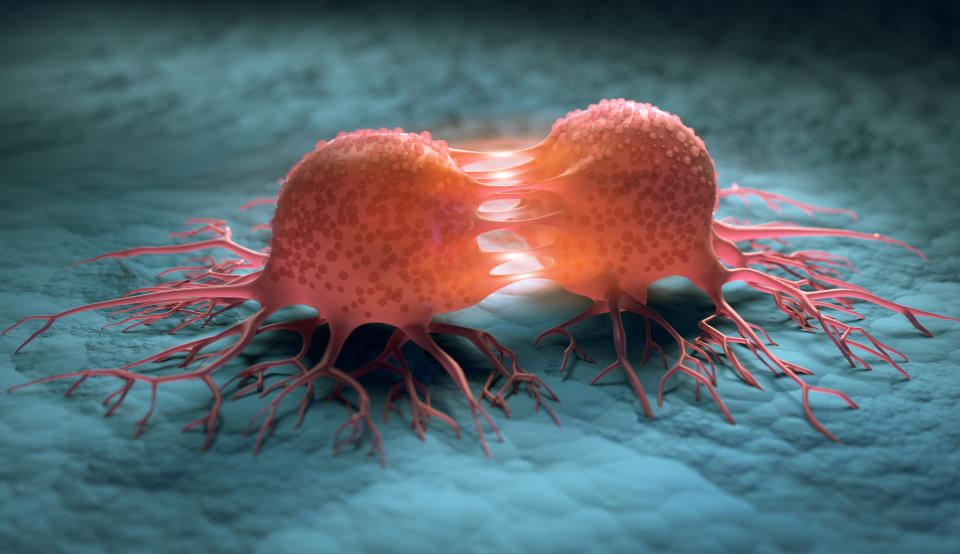Vaccine prolongs life in mice with lung cancer, study suggests

A vaccine has shown promise among mice with lung cancer.
Scientists from The Francis Crick Institute in London have created a jab that targets a gene involved in the development of many types of tumours, including those in the lungs, bowel and pancreas.
When given to mice with lung cancer, just under two-thirds (65%) of the rodents were still alive 75 days later. This is compared to just 15% of the animals that were not vaccinated.
Read more: 3 million Britons missing out on cancer screening since March
The scientists also found the jab helped to delay tumour onset in mice that were induced to develop cancer.
While there is “a long way to go”, one expert hopes “these promising approaches will one day be reproduced in patients”.

One in two people born after 1960 in the UK will statistically develop cancer at some point in their life.
Scientists have known for decades that mutations to the gene KRAS can trigger tumours.
“We know if KRAS goes wrong, it enables cells in our bodies to start multiplying and turning into cancer cells,” said study author Dr Rachel Ambler.
Read more: Breathalyser diagnoses head and neck cancer with up to 86% accuracy
“Recently, we’ve learned that, with the right help, the body’s immune system might be capable of slowing this growth.
“We wanted to see if we could use this knowledge to create a cancer vaccine that could not only be used to treat cancer, but also give long-lasting protection against cancer, with minimal side-effects.”
Watch: Mother has lung cancer and COVID-19
The Francis Crick scientists developed a set of vaccines that stimulate an immune response against the most common KRAS mutations.
The jabs are made up of a fragment of the protein produced by cancer cells with a mutated KRAS gene.
They also contain a protein that helps to deliver the vaccine’s active ingredients to dendritic cells within the immune system, which work to spot and destroy malignant tissue.
When given to mice with pre-existing lung cancer, the vaccine helped to prolong their life.
In a second part of the experiment, the jab was given to rodents just before they were induced to have lung tumours.
Read more: Bee venom kills breast cancer cells in lab within an hour
Results – which will be presented at the virtual EORTC-NCI-AACR Symposium on Molecular Targets and Cancer Therapeutics – revealed two in five (40%) of these vaccinated animals remained tumour-free 150 days later.
This is compared to just 5%, or one mouse, among the unvaccinated rodents.
Vaccinating the mice was found to delay the onset of tumours by around 40 days, the study found.
“When we used the vaccine as a treatment, we found it slowed the growth of cancers in the mice,” said Dr Ambler.
“When we used it as a preventative measure, we found no cancers grew in the mice for quite a long period of time and, in many cases, cancers never developed.
“Previous trials of cancer vaccines have failed because they have not been able to create a strong enough response from the immune system to find and destroy cancer cells.
“This research still has a long way to go before it could help prevent and treat cancer in people, but our results suggest the design of this vaccine has created a strong response in mice with very few side-effects.”
The same scientists also investigated how lung cancers evade the immune system, making them harder to treat.
“In patients with some of the most aggressive cancers, we discovered the activity of the KRAS gene results in the build up of a chemical called adenosine,” said co-author Dr Sophie de Carné.
“Higher levels of adenosine are known to dampen the body’s immune response, making it harder for immune cells to target and destroy cancer cells.”
To determine whether adenosine levels can be manipulated, the scientists studied mice with cancers that had similar KRAS activity.
The rodents were given the drug oleclumab, which lowers adenosine, alongside existing cancer treatments that help the immune system fight the disease.
Once again, the results suggested this treatment regimen prolonged the diseased animals’ life.
“Together these results suggest it could eventually be possible to identify patients who have this aggressive type of lung cancer, and use a combination of drugs to support their immune system and successfully treat their tumours,” said co-author Dr Phil East.
Dr James Gulley from the EORTC-NCI-AACR Symposium added: “These studies focus on types of cancer, such as lung and pancreatic cancer, that are difficult to treat.
“Survival rates for these cancers remain very poor so we urgently need new treatments for patients.
“Boosting the immune system with drugs to treat cancer or even developing a vaccine to prevent cancer are both exciting possibilities, especially if they can be achieved with minimal side effects.
“We hope these promising approaches will one day be reproduced in patients.”
Watch: Rihanna’s Fenty campaign features breast cancer survivors


